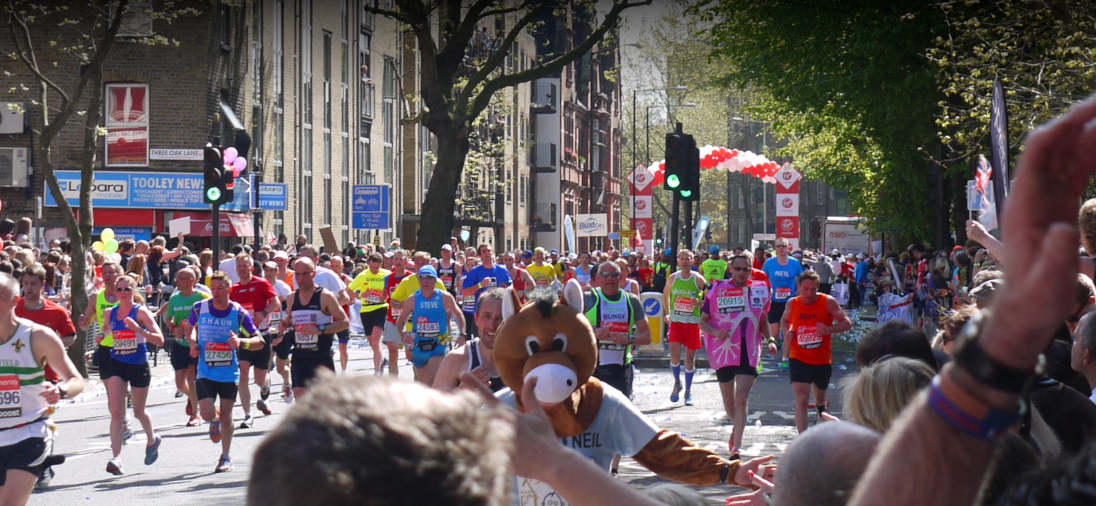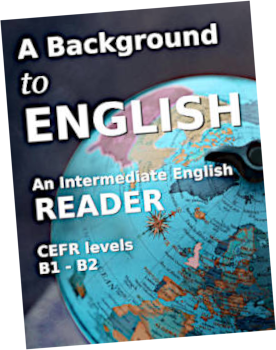
Marathons !
What are they all about?
A2 - B1 simple
English
WITH AUDIO ►: Click to open/close audio player
An interview with Jo Parker
Marathons are not new.
The first marathon race took place
in Boston in 1897! Today's marathons are very different from the first
Boston marathon. They are very big. Often thousands of people run in a
marathon, and there are marathons in lots of cities. The first London
Marathon took place in 1981, and seven and a half thousand people ran
in the race. The following year, 17,000 people took
part. In 2024, 53,700 people finished the London Marathon!
Jo Parker is a young lady who loves to run in marathons. Linguapress
reporter PETER asked her about her sport.
PETER: Who can run in a marathon, Jo?
JO: Anyone can. That's why they're so popular. But you have to train before the race.
PETER: What about you? How long do you train for?
JO: I run for at least an hour, four times a week.
PETER: How fast do you run?
JO: If you want to run in a marathon, you have to be able to run 6 miles in fifty minutes.
PETER: Is that fast?
JO: Well, for some people. But the world record for the marathon is 2 hours 1 minute and 39 seconds!
PETER: And how long is a marathon, exactly?
JO: 26.2 miles!
PETER: That's a long way. I suppose lots of people stop before the end of the race.
JO: Not at all. At least 90% of the runners finish — even if they take a long time. In big races, like the London marathon, some people take 8 or 9 hours to finish. Often, they haven't trained enough, and they run too quickly at the start. But usually, there aren't any bad accidents.
PETER: Why do people run in marathons, Jo?
JO: Well, some people run to win. But there aren't many people like that. Most people just run for fun.
PETER: What about you, Jo? Why do you run?
JO: I like running. I feel good when I run. I also feel healthy when I run a lot. And I think it helps you in other ways. You know, you feel good and healthy, and you feel in control of your life.

Return to Linguapress site index
Printing: Optimized for printing
Copyright © Linguapress. Do not copy this document to any other website
Student Worksheet
Marathon
Interactive exercise - use on screen or on paper: Missing wordsSome of the more useful words have been omitted from this copy of the interview. As you listen to the interview, try to replace all the missing words.
JO: Anyone can. That's they're so popular. But you have to train the race.
PETER: What you? How long do you train ?
JO: I run at least an hour, four times a week.
PETER: fast do you run?
JO: If you want to run in a marathon, you to be able to run 6 miles in fifty minutes.
PETER: Is that fast?
JO: Well, for some people. But the record for the marathon is 2 hours 1 minute and 39 seconds!
PETER: And long is a marathon, exactly?
JO: 26.2 miles!
PETER: That's a long way. I suppose lots of people stop the end of the race.
JO: Not at all. At least 90% of the runners finish — if they take a long time. In big races, the London marathon, some people take 8 or 9 hours finish. Often, they haven't trained , and they run too quickly at the start. But usually, there aren't bad accidents.
PETER: do people run in marathons, Jo?
JO: Well, some people run to win. But there aren't many people that. Most people just run fun.
PETER: What you, Jo? Why do you run?
JO: I like running. I feel good when I run. I also feel healthy when I run a lot. And I think it helps you in ways. You know, you feel good and healthy, and you feel in of your life.
For
teachers:
Vocabulary
Missing words exercise: the best way to use this in class is to play the audio line by line, giving pupils or students time to fill in the missing words. Among the missing phrases is the common expression "what about", to be compared with the subtitle "What is it about?", meaning "What happens, and why?"Confusable verbs: The introduction contains two verbs that are very useful, but often confused: to take place and to take part.
Time and numbers: Note the expressions that concern time and numbers. Ask students to pronounce the biggest number in the introduction, 53,700. "Fifty-three thousand, seven hundred" (there is no "and" in this number).
Questions: The expression what about. This interrogative expression is very common in spoken English. Exceptionally, questions with what about do not require a verb. The verb can be implicit, not explicit, as in What about you? Meaning what do you think? or something similar.
In addition, note the other question expressions used by Peter, in particular how + adjective, as in how long and how fast.
A marathon. The term comes from a village in Greece called Marathon. In 490 BC, the Greek army defeated a Persian army at Marathon, and a messenger ran all the way back to Athens, a distance of about 22 miles, to bring the news.
More.... What is A2 English? What does it entail?
Other ideas?
EFL teachers: Help develop this resource by contributing extra teaching materials or exercises.
To contribute click here for further details
This teaching resource is © copyright Linguapress 2024
Republication on other websites or in print is not authorised
| Linguapress; home | Découvrez l'Angleterre (en français) | Discover Britain |




